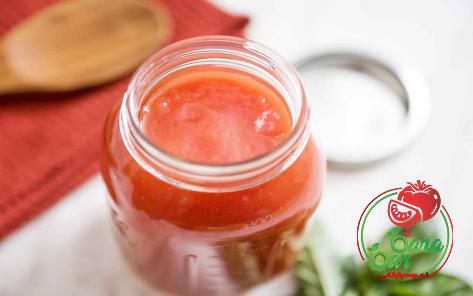Among different types of packaging available for tomato paste canned type is one of the popular packaging of this product with a fair price.
Canned tomato paste
Tomato paste is basically supplied in various packaging like cans, bottles, glass jars, sachets, and drums. Each of the packaging has its own advantages and disadvantages. In this part of my article, I want to elaborate some important reasons for the popularity of canned tomato paste compared to other packaging. The first reason is that cans keep the products inside fresh and flavorful for a longer period of time. This is because cans limit exposure to both light and oxygen, the tomato paste inside remains fresh and flavorful for a longer period of time. The aluminum container is completely sealed during the canning process, preventing additional oxygen from reaching the paste until the can is opened. Another reason is that cans are more environment friendly. In terms of environment, I should say that cans are lighter and more compact, shipping them requires less fuel. In addition to that, most communities have more robust recycling and deposit programs for aluminum than they do for glass or plastic. Finally, it is approved by different researches that canned tomato paste is better in flavor compared to plastic ones. Like many people, you may believe that tomato paste tastes better in a bottle. Blind taste tests, however, have revealed that there is no discernible difference in the flavors of bottled and canned tomato paste. 
Tomato paste shelf life
An important question for the buyers of canned food products like tomato paste can be how long the shelf life of an unopened can of tomato paste will be? To maximize shelf life, store in a cool, dry place. At room temperature, how long does an unopened can of tomato paste last? An unopened can of tomato paste will generally keep its best quality for about 18 to 24 months if properly stored, but it will usually be safe to use after that. The expiration date of food products is an important factor for the safety of that, but sometimes it is possible to use tomato paste after that date. If properly stored and the can is undamaged – commercially packaged tomato paste will typically carry a “Best By,” “Best if Used By,” “Best Before,” or “Best When Used By” date. But this is not a safety date; rather, it is the manufacturer’s estimate of how long the tomato paste will remain at peak quality. The storage time indicated is only for best quality – after that, the texture, color, or flavor of the tomato paste may change, but it will still be safe to consume if properly stored, the can is undamaged, and there are no signs of spoilage.  The best way is to understand whether tomato paste is bad or spoiled is to smell and inspect the tomato paste. If it develops an off-odor, flavor, or appearance, or if mold appears, it should be discarded. Considering the best time to store the paste can also help you determine the time of deterioration based on how you store it. Typically, homemade paste should be stored in the refrigerator for 1 to 3 months. Of course, if the paste is used correctly, it can be stored for an extended period of time. To determine the best storage time for canned tomato paste, pay attention to the production date and expiration date engraved on the can (depending on the condition that the can is unopened and sealed). Canned pastes typically have a longer shelf life than homemade pastes. When homemade paste is less boiled and slightly juicy, it has a shelf life of 7 to 10 days. Because the presence of moisture causes these pastes to rot and mold more quickly. To store less boiled homemade pastes, use the freezer instead of the refrigerator and follow the methods for freezing tomato paste. The best time to freeze tomato paste is usually between 4 and 6 months.
The best way is to understand whether tomato paste is bad or spoiled is to smell and inspect the tomato paste. If it develops an off-odor, flavor, or appearance, or if mold appears, it should be discarded. Considering the best time to store the paste can also help you determine the time of deterioration based on how you store it. Typically, homemade paste should be stored in the refrigerator for 1 to 3 months. Of course, if the paste is used correctly, it can be stored for an extended period of time. To determine the best storage time for canned tomato paste, pay attention to the production date and expiration date engraved on the can (depending on the condition that the can is unopened and sealed). Canned pastes typically have a longer shelf life than homemade pastes. When homemade paste is less boiled and slightly juicy, it has a shelf life of 7 to 10 days. Because the presence of moisture causes these pastes to rot and mold more quickly. To store less boiled homemade pastes, use the freezer instead of the refrigerator and follow the methods for freezing tomato paste. The best time to freeze tomato paste is usually between 4 and 6 months. 
Tomato paste preservatives
Given that tomato paste is the most popular seasoning all over the world, it is really important to know which preservatives are used in it. Tomato paste is present in almost every food, from stew to pizza, so we should obtain information about its preservatives. Because, according to some studies, preservatives and additives which are used in foods to increase its shelf life, can have long-term negative effects on the liver. Salt is the first preservative in industrial pastes. This ingredient enhances the flavor of the tomato paste and extends its shelf life. It also reduces the amount of tomato paste mold. However, the amount of salt that can be used as a preservative in industrial tomato paste is limited, because too much salt is bad for human health. In fact, according to health organizations standards, the amount of salt in the paste should not be more than 1 or at least 2%. Because pouring more than this amount can make the paste dangerous for many people who have diseases such as high blood pressure, heart problems, and so on. As a result, salt cannot be used as a preservative in industrial tomato paste.  Preservatives will most likely be added by tomato paste manufacturers at this point. Tomato paste preservatives are used to keep it from becoming moldy. As a result, if a manufacturer also uses them, the percentage is usually low, and the paste is not classified as a high-risk food item. Of course, the method of production of this product also contributes to the fact that the preservative in tomato paste does not contribute significantly to its total. Indeed, industrial pastes are pasteurized with high heat followed by a cold-water shower. This process destroys the majority of the contamination and germs in the paste, and the method of filling the cans and its material is another factor in the paste’s health. As a result, industrial paste has a longer shelf life than many canned foods. To keep tomato paste from becoming moldy, a small amount of preservatives are added. Of course, the effect of these ingredients is enhanced until the can’s lid is removed.
Preservatives will most likely be added by tomato paste manufacturers at this point. Tomato paste preservatives are used to keep it from becoming moldy. As a result, if a manufacturer also uses them, the percentage is usually low, and the paste is not classified as a high-risk food item. Of course, the method of production of this product also contributes to the fact that the preservative in tomato paste does not contribute significantly to its total. Indeed, industrial pastes are pasteurized with high heat followed by a cold-water shower. This process destroys the majority of the contamination and germs in the paste, and the method of filling the cans and its material is another factor in the paste’s health. As a result, industrial paste has a longer shelf life than many canned foods. To keep tomato paste from becoming moldy, a small amount of preservatives are added. Of course, the effect of these ingredients is enhanced until the can’s lid is removed. 










Your comment submitted.